Ciné Gael Montréal Irish Film Series 2025 ...our 33rd
2025 is the 100th Anniversary of the establishment of Ireland's boundaries between the North and the Free State being agreed; The first film made in Ireland, The Lad From Old Ireland (1910) was already fifteen years in the can. Film making in Ireland has continued to blossom and we'll see much evidence of that this season. The series that our film programmers have assembled is an exciting fresh look at recent Irish filmmaking. This is also the 50th anniversary of Concordia.
In 1992, the Cultural Committee of the St. Patrick's Society of Montréal
received a proposal from film-buff Anthony Kirby that Montréal needed an Irish film series; as it happens, Kevin O'Higgins,
one of Anthony's uncles, was in the government of the Free State in those early years.
The committee agreed to fund the wildly hysterical plans of Lynn Doyle, Patrick Vallely
and several other miscreants, to form and run a film society devoted to showing Irish Films.
The name Ciné Gael Montréal was proposed and scheduling and film selection started, with outside assistance coming from Fr. Marc Gervais SJ, Peter Rist, Ben Queenan and most importantly, the film archives and screening facilities at Concordia University. Early in 1993, we screened our first film.
On our 20th anniversary, when we asked our members to tell us the film from our past seasons that we should show again, it was that first film.
Read more about our history, written by Dana Hearne on our 10th and our 15th anniversary, as well as John Griffin's article from the Gazette, written on our 20th anniversary in January 2012. This is our film schedule flyer for 1993, front and back.
Concordia University, 1400 de Maisonneuve West, at 7:15 PM, unless otherwise indicated.
92 min - Dir and Screenwriter: Eva Birthistle
Produced by Claire McCaughley for Treasure Entertainment
with: Hazel Doupe, Clare Dunne, Peter Coonan,
Aaron Monaghan, Liadan Dunlea, James McGowan
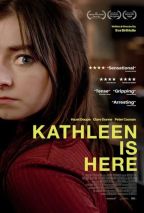 "Having already impressed on screen with her considerable acting talent, Birthistle shows
great prowess behind the camera. Serving as writer and director, she shines a light on the
grim reality of isolation and abandonment. In an early scene, Kathleen is home alone. Watching
a video on her phone, she laughs along and replies to the people on screen, performing like
she’s talking to an old friend as opposed to strangers on a screen. While many teenage girls
use social media to stay connected, Kathleen uses it for the illusion of connection.
"Having already impressed on screen with her considerable acting talent, Birthistle shows
great prowess behind the camera. Serving as writer and director, she shines a light on the
grim reality of isolation and abandonment. In an early scene, Kathleen is home alone. Watching
a video on her phone, she laughs along and replies to the people on screen, performing like
she’s talking to an old friend as opposed to strangers on a screen. While many teenage girls
use social media to stay connected, Kathleen uses it for the illusion of connection.
Her outsider status is solidified throughout the film. Whether it’s Kathleen peering through
a car window, supermarket shelf or the glass pane of a bus station, she is always on the
outside looking in. During a particularly memorable scene, Birthistle employs a tactical
close-up shot of Kathleen. Leaving the camera observe, uninterrupted, Kathleen becomes
the focal point. This scene is made all the more powerful by the fact that she has been
so systemically marginalised and cast aside, unseen."
- Film Ireland
[Matthew Briody]
"Actor Eva Birthistle makes an impressive start to her feature directing career with this psychologically complex and tense Irish drama focused on a teenager fresh out of the care system. Expanding on her 2020 short Kathleen Was Here, which also starred charismatic up-and-comer Hazel Doupe (You Are Not My Mother) in the lead, the writer/director offers a combination of raw realism and tough-love empathy that recalls the early work of Andrea Arnold." - Screen Daily [Amber Wilkinson]
 "Perhaps unsurprisingly for an actor-turned-director, Birthistle gives her actors time
and space to deliver. A chat between Dee and Kathleen in a car as the rain beats down
is allowed to gather intensity and she also pays attention to body language and proximity,
allowing the physical closeness between two women to take on a charge.
"Perhaps unsurprisingly for an actor-turned-director, Birthistle gives her actors time
and space to deliver. A chat between Dee and Kathleen in a car as the rain beats down
is allowed to gather intensity and she also pays attention to body language and proximity,
allowing the physical closeness between two women to take on a charge.
As a screenwriter,
Birthistle imbues both characters with rich emotional detail so that the women’s relationship
is far from a one-way street. Kathleen’s ambiguity towards Conor is also used as a potential
flashpoint in a film that carries a general unease about what the unpredictable teenager
might do at the same time as refusing to sit in judgement over her because of it. Even when
Kathleen is on the brink of bad choices, Birthistle ensures we still care."
- Screen Daily
[Amber Wilkinson]
"Kathleen Is Here ranks among the most compelling domestic offerings of 2024, the well-told small story that asks a lot of big questions. Birthistle and Doupe are a formidable duo. They need to work together again as soon as possible and, indeed, catch up with Kathleen a few years down the line. You'll want to know what happens to her next - guaranteed." - RTÉ [Harry Guerin]
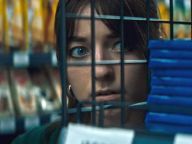 After her social worker, Damian (Aaron Monaghan), tells Kathleen she has to get a job,
she initially befriends shop assistant Yvonne (Liadan Dunlea). However she soon learns Yvonne’s
intentions aren’t the most selfless. Learning this young woman is on her own, kind, concerned
neighbour Dee (Clare Dunne) introduces herself to Kathleen. As the pair become closer,
Dee’s husband, Rory (Peter Coonan), and son, Conor (James McGowan), question Kathleen’s
motives. When tensions rise, Kathleen becomes desperate to hold on to the tentative friendships she’s formed.
After her social worker, Damian (Aaron Monaghan), tells Kathleen she has to get a job,
she initially befriends shop assistant Yvonne (Liadan Dunlea). However she soon learns Yvonne’s
intentions aren’t the most selfless. Learning this young woman is on her own, kind, concerned
neighbour Dee (Clare Dunne) introduces herself to Kathleen. As the pair become closer,
Dee’s husband, Rory (Peter Coonan), and son, Conor (James McGowan), question Kathleen’s
motives. When tensions rise, Kathleen becomes desperate to hold on to the tentative friendships she’s formed.
By combining stark realism with intense thrills, the film is suspenseful, yet sombre. Focusing
on Kathleen, Birthistle examines what happens when a young woman is neglected by the system.
...Burschi Wojnar’s cinematography reinforces the bleakness of Kathleen’s world. Whenever
she is at home, her space is shrouded in low lights and darkness. The only light is the glow from
her phone screen. By visually depicting this exterior darkness, Kathleen’s inner turmoil is
spotlighted all the brighter.
Hazel Doupe was only eighteen when she first took on the role of Kathleen in the original
short film. Now, at the young age of twenty two, Doupe delivers a performance even weightier
and more complex. She is the anchor holding the film together. Her multi-layered portrayal
captures the rage and vulnerability of a woman forced to the fringes of society. Doupe’s first
on-screen appearance was in the 2010 TV series Jack Taylor
when she was eight years old, it’s evident from this film, she has been honing her craft since then.
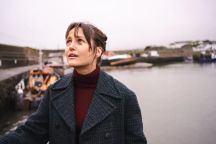 Doupe’s ability to effortlessly move from primal rage to heartbreaking raw emotion is
unrivaled. She has already won a Discovery Award for her role in the original short film and
been nominated for an IFTA award for her role in Kate Dolan’s horror film
You Are Not My Mother (2021). The accolades continue
for this film, as Eva Birthistle won the Bingham Ray New Talent
at the Galway Film Fleadh this year and a nomination for
Best International Feature at the
2024 Raindance Film Festival.
Doupe’s ability to effortlessly move from primal rage to heartbreaking raw emotion is
unrivaled. She has already won a Discovery Award for her role in the original short film and
been nominated for an IFTA award for her role in Kate Dolan’s horror film
You Are Not My Mother (2021). The accolades continue
for this film, as Eva Birthistle won the Bingham Ray New Talent
at the Galway Film Fleadh this year and a nomination for
Best International Feature at the
2024 Raindance Film Festival.
Thanks to its committed performances and taut tension throughout,
Kathleen Is Here delivers a steadfast and riveting ride. With
an engrossing plot and perfect pacing, this film is nothing short of impressive.
- Film Ireland
[Matthew Briody]
1h 42m - Director, and Writers: George Kane, Demian Fox, Shane O'Brien, James Walmsley
with: David Earl, Natalie Palamides, Amy De Bhrún, Fionn Foley, Tadhg Murphy, Ivan Kaye
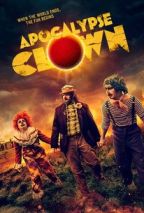 "It’s hard to refuse this comedy caper penned by members of madcap theatre troupe Dead Cat Bounce, such is its
gung-ho vim and uniquely silly premise. Pick of the anarchic ensemble is Natalie Palamides’s maniacal street clown,
a mini-riot unto herself."
Irish Independent
[Hilary White]
"It’s hard to refuse this comedy caper penned by members of madcap theatre troupe Dead Cat Bounce, such is its
gung-ho vim and uniquely silly premise. Pick of the anarchic ensemble is Natalie Palamides’s maniacal street clown,
a mini-riot unto herself."
Irish Independent
[Hilary White]
"Obviously, (this) will suggest that the plot is an absurdist farce that keeps piling on ridiculous elements and crazy twists of fortune, just like the rickety human tower the clowns put on as a spectacle for an audience of murderous children. That’s exactly what makes it fun, even if some of the jokes splat like cream pies. There’s always another one seconds later, and director George Kane keeps the energy up throughout, helped along by a game-for-it cast that know exactly how to pitch the material." The Guardian [Leslie Felperin]
 Not for an age has the humble clown been seen doing what it was put on Earth to do – entertain the wee ones with
primary-coloured tomfoolery.
Not for an age has the humble clown been seen doing what it was put on Earth to do – entertain the wee ones with
primary-coloured tomfoolery.
Blame any number of horror films and arch parodies for consigning the once-noble dramatic discipline to either a
spook device or a punchline in itself.
Embracing this demise wholesale is this gonzo Fleadh-winner directed by George Kane. Bobo (David Earl) is
a past-it clown who can’t catch a break. At the funeral of a clown guru, he bumps into reporter and old flame
Jenny (Amy De Bhrún), before both are caught up in a brawl with other red-nosed mourners.
Released from jail the next day, Bobo, Jenny, and a small rabble of assorted clowns emerge to discover that
Ireland has transformed into a silent, post-apocalyptic wasteland. They set off in search of answers –
and a possible shot at redemption, now that the competition has vanished.
It’s hard to refuse this comedy caper penned by members of madcap theatre troupe Dead Cat Bounce,
such is its gung-ho vim and uniquely silly premise. Pick of the anarchic ensemble is Natalie Palamides’s
maniacal street clown, a mini-riot unto herself.
Four stars
- Irish Independent
[Hilary White]
 For years, Bobcat Goldthwait’s cult classic Shakes the Clown was the only adult-oriented
black comedy featuring an almost all-clown list of dramatis personae. But hooray – now there’s another one! Or nearly,
because admittedly there are a few nonclown characters here. This superbly titled film is a goofy, wildly uneven
but ultimately watchable low-budget Irish caprice that mostly revolves around an ad hoc troupe of outsider clowns
(a phrase that may be a tautology) who are thrown together when a freak solar flare wipes out all the electricity
in Ireland, or maybe the world.
For years, Bobcat Goldthwait’s cult classic Shakes the Clown was the only adult-oriented
black comedy featuring an almost all-clown list of dramatis personae. But hooray – now there’s another one! Or nearly,
because admittedly there are a few nonclown characters here. This superbly titled film is a goofy, wildly uneven
but ultimately watchable low-budget Irish caprice that mostly revolves around an ad hoc troupe of outsider clowns
(a phrase that may be a tautology) who are thrown together when a freak solar flare wipes out all the electricity
in Ireland, or maybe the world.
Luckily, Bobo (David Earl), a washed-up clown with a squirty-flower boutonniere and little to no talent,
does have a wind-up car that doesn’t need electricity. He ends up piling in the vehicle with prissy aspirant
mime-clown Pepe (Fionn Foley), a helium-voiced street clown named Funzo (Natalie Palamides, giving an antic
scene-stealer of a performance) who may have “gone Scary” judging by her Pennywise look, duplicitous gag-thief
The Great Alfonso (Ivan Kaye) and, strapped to the car roof, the corpse of Pepe’s erstwhile mentor,
clown emeritus Jean DuCocque (Barry McGovern).
Along the way, they meet up with Jenny (Amy De Bhrún), a journalist who once hooked up with Bobo in a broom cupboard,
a fact that her colleagues never let her forget. Jenny is determined to prove her theory about how the solar flare
is connected to various other conspiracy theories, and ends up with blowhard Alfonso seeking out an ageing,
reclusive former boyband member who is called “Tim from Bromanz” (Tadhg Murphy). The rest of the gang
fall in with some ravers waiting out the apocalypse with buckets full of drugs, until two living statues
who have a beef with Fonzo (one who looks like a bronzed James Joyce and the other a green-skinned Statue of Liberty),
catch up with them again in a running gag that somehow gets funnier as the film unfurls.
- The Guardian
[Leslie Felperin]
1h 45m - Dir: Karl R. Hearne with: Dale Dickey, Romane Denis, Roc Lafortune
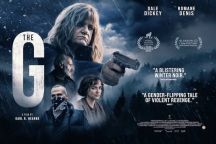 "Character actor phenom Dale Dickey does her finest work yet in an electrifying performance as Ann,
a woman fighting for her life and her granddaughter’s. The G is a
twisted biblical fable that opens on someone’s mouth, gasping for air, buried under desert sand
as two men keep shoveling. Horrifying."
- What She Said
[Anne Brodie]
"Character actor phenom Dale Dickey does her finest work yet in an electrifying performance as Ann,
a woman fighting for her life and her granddaughter’s. The G is a
twisted biblical fable that opens on someone’s mouth, gasping for air, buried under desert sand
as two men keep shoveling. Horrifying."
- What She Said
[Anne Brodie]
"Gripping Social Thriller Says You're Never Too Old to Fight Back.
The G is a raw, gripping thriller that latches onto its most powerful asset:
Dale Dickey’s extraordinary performance."
- Original Cin
[Thom Ernst]
"Presenting one of the year’s most unlikely anti-heroes,
The G crackles with tension and suspense. A darkly engaging work, the film
raises awareness about legal guardianships while showing that the elderly are often sprier than you think."
- That Shelf
[Courtney Small]
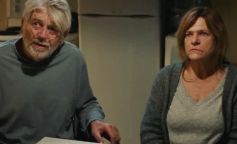 ...meanwhile, her “granddaughter” Emma (Romane Dennis) is looking for her knowing she’s in danger.
The two are committed to retrieving trust funds stolen from them by a guardian who is well-protected
by his hired assassins. It’s ok says Ann – “I am ruthless. You have to be”. In the course of their hellish journey,
Ann shoots a man in the crotch, and another in the head, and stabs a man repeatedly in the stomach
while Emma is forced to her parent’s house where mystery men shoot her father in the face. She’s also
subject to death threats, and witnesses her male friend brutally dispatched. They are in desperate,
evil territory, neck deep in violence, deceit, and fear, but they are alive and “ruthless”. And Emma’s a fast learner.
...meanwhile, her “granddaughter” Emma (Romane Dennis) is looking for her knowing she’s in danger.
The two are committed to retrieving trust funds stolen from them by a guardian who is well-protected
by his hired assassins. It’s ok says Ann – “I am ruthless. You have to be”. In the course of their hellish journey,
Ann shoots a man in the crotch, and another in the head, and stabs a man repeatedly in the stomach
while Emma is forced to her parent’s house where mystery men shoot her father in the face. She’s also
subject to death threats, and witnesses her male friend brutally dispatched. They are in desperate,
evil territory, neck deep in violence, deceit, and fear, but they are alive and “ruthless”. And Emma’s a fast learner.
As awful as this story is, it spotlights male dominance, misogyny, and violence that nearly ruins two women.
But they stand up for themselves, become their own best defense and mete out justice, or try to. It bears
repeating that Dickey, a masterful artist, is superb, an ageing warrior protecting her loved one at any cost
with one of the most expressive faces onscreen these days…wow. The G is deeply shocking and
inspiring and do not miss Dickey’s performance!
- Screen Daily
[Fionnuala Halligan]
 A veteran character actor with a career spanning decades in film and television, Dickey commands the screen
with an intensity rarely afforded to leads of her age. As Ann—referred to by her family simply as "The G" —
Dickey crafts a character as complex as she is resilient.
A veteran character actor with a career spanning decades in film and television, Dickey commands the screen
with an intensity rarely afforded to leads of her age. As Ann—referred to by her family simply as "The G" —
Dickey crafts a character as complex as she is resilient.
Ann’s face, etched with the struggles of a hard-lived life, becomes a canvas for shame, guilt,
and a fierce determination to endure. Every line on her face, every tired yet unflinching gaze, tells a story of survival.
Ann is no saint. She’s a wife, mother, and grandmother whose better days—which weren’t all that great
in the first place—are long behind her. She’s hardened by years of bad decisions, alienated family,
and the unshakable weight of regret.
Now, with her once strong and protective husband Chip (played with poignant subtlety by Greg Elward)
weakened by age and illness, Ann finds herself targeted by a ruthless agency exploiting legal loopholes
to strip her of her home, finances, and dignity. When the agency goes too far, Ann, battered but unbroken,
rises as an unlikely vigilante, proving there is no age barrier to rebellion.
The relationship between Ann and her granddaughter Emma (Romane Denis) is the emotional heart of the film.
Emma, the only family member who truly sees and admires Ann, shares her grandmother’s instinct for
defiance. Their bond is a bright thread of hope in an otherwise bleak narrative, and their shared spirit
of resistance makes the film’s central conflict even more compelling.
Director Karl R. Hearne turns this story of quiet fury into a simmering slow burn. Unlike films that
merely bide their time for a climactic payoff, The G keeps viewers
hooked with every moment of tension, every glance and pause loaded with meaning. There are echoes
of Hal Hartley’s early work here, with its small-town textures and understated wit. The film also nods
to the likes of John Cassavette’s Gloria in its depiction of a woman
reclaiming her agency, though it takes a grittier, more grounded approach.
While Dickey’s nuanced performance anchors the film, the supporting cast, particularly the villains,
veer into caricature. Their exaggerated idiosyncrasies — like an odd fixation on hard-boiled eggs —
distract from the otherwise grounded tone. These shortcomings, however, do little to diminish the film’s
overall impact.
At its core, The G is a showcase for Dickey, elevating her from reliable
character actor to a forceful lead. Her performance is a masterclass in restraint, revealing vulnerability
and longing beneath Ann’s tough exterior. This is a woman who has lost nearly everything yet still
clings to the hope—however faint—that she can set things right.
Though the film doesn’t entirely escape comparisons to similar stories, it stands out for its raw
emotional honesty and willingness to confront uncomfortable truths about aging, family, and redemption.
The G isn’t just about fighting back; it’s about the quiet dignity
of survival, even in the face of insurmountable odds. And for that, it’s worth a trip to the movie theatre.
- Original Cin
[Thom Ernst]
111 mins - Writer & Dir: Pat Collins; Produced by Brendan J. Byrne, Tina O'Reilly, Tina Moran with Barry Ward, Anna Bederke, Lalor Roddy, Ruth McCabe, Phillip Dolan, Sean McGinley, Brendan Conroy
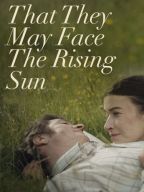 "Pat Collins has made many fine films down the years, and surpasses himself with this elegiac
adaptation of John McGahern’s final novel. Young couple Joe and Kate Ruttledge (Barry Ward,
Anna Bederke) have left London to live in Joe’s native Leitrim townland. It’s the 1980s,
times are tough, and the locals wonder if Joe had a screw loose returning to this economically
stagnant backwater. Joe’s a writer, Anna’s an artist, and over time they earn
the affection and trust of their neighbours."
- Irish Independent
[Paul Whitington]
"Pat Collins has made many fine films down the years, and surpasses himself with this elegiac
adaptation of John McGahern’s final novel. Young couple Joe and Kate Ruttledge (Barry Ward,
Anna Bederke) have left London to live in Joe’s native Leitrim townland. It’s the 1980s,
times are tough, and the locals wonder if Joe had a screw loose returning to this economically
stagnant backwater. Joe’s a writer, Anna’s an artist, and over time they earn
the affection and trust of their neighbours."
- Irish Independent
[Paul Whitington]
"Director/co-writer Pat Collins builds on his experience in documentaries to depict these lives in exquisite, melancholy detail. This is a slow piece of great warmth and sympathy that invites viewers to find the beauty in birdsong, long grass and works left half-finished. From the fragility of provincial communities to the ways metropolitan perspectives commingle with old-world attitudes, its themes are rich and rewarding. A lyrical lament for fading summers. Bring a tissue." - RadioTimes.com [Sean McGeady]
"With so much going on under the surface the performances need to be particularly strong
and the film has a cast of veterans only too willing to take on some of the richest roles
in their careers. Lalor Roddy, Ruth McCabe, Seán McGinley, Brendan Conroy etc. etc. –
all excellent actors with great bodies of work already, give their all in a perfect ensemble
while Barry Ward and Anna Bederke are essentially standing in for us, and do an excellent job of it.
Their playing really draws us into their world and when there is the possibility that
they might have to return to living in London it feels like a real threat. Joe and Kate are not
just observers of the community, they are very much part of it, never more so than in the
deeply moving scenes around the afore-mentioned funeral of one much-loved member."
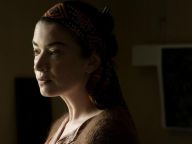 "Having already made a celebrated documentary on John McGahern, Pat Collins was always
going to be the right director to make this film but his own distinctive style makes him
an ideal choice as well. Simply put, he makes films the way John McGahern wrote books
and this is the most perfectly matched pairing of author to filmmaker since William Trevor
and Pat O’Connor. In previous films like Silence and Song of Granite Collins has already
proved that he doesn’t need a major plot to make a really good film.
Here he has managed to make a great one."
- Film Ireland Magazine
[Mick Jordan]
"Having already made a celebrated documentary on John McGahern, Pat Collins was always
going to be the right director to make this film but his own distinctive style makes him
an ideal choice as well. Simply put, he makes films the way John McGahern wrote books
and this is the most perfectly matched pairing of author to filmmaker since William Trevor
and Pat O’Connor. In previous films like Silence and Song of Granite Collins has already
proved that he doesn’t need a major plot to make a really good film.
Here he has managed to make a great one."
- Film Ireland Magazine
[Mick Jordan]
"It’s only April but I’m already pretty sure what the best Irish film
of 2024 will be. Pat Collins’ That They May Face the Rising Sun
is so good, so confident in its storytelling and so clear in its intentions that it’s hard
to imagine a better homegrown feature appearing before the end of the year.
Back in 2005, Collins released A Private World, a mesmerising profile
of John McGahern. The great novelist died a year later, but his final book,
That They May Face the Rising Sun, stayed with Collins, who for years
dreamed of turning it into a feature film. Now he has succeeded, triumphantly."
- Irish Independent
[Paul Whitington]
"Director/co-writer Pat Collins builds on his experience in documentaries to depict these lives in exquisite, melancholy detail. This is a slow piece of great warmth and sympathy that invites viewers to find the beauty in birdsong, long grass and works left half-finished. From the fragility of provincial communities to the ways metropolitan perspectives commingle with old-world attitudes, its themes are rich and rewarding. A lyrical lament for fading summers. Bring a tissue." - RadioTimes.com [Sean McGeady]
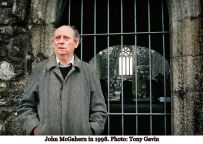 Though McGahern’s fictional world is rooted in Co Leitrim, where he lived and ran a small farm,
That They May Face the Rising Sun was filmed elsewhere.
“We shot in Co Galway, along the Mayo border, a beautiful part of the world. McGahern’s
world is very much Leitrim, but the locations we found were in Connemara, and you can
see why when you watch the movie.
Though McGahern’s fictional world is rooted in Co Leitrim, where he lived and ran a small farm,
That They May Face the Rising Sun was filmed elsewhere.
“We shot in Co Galway, along the Mayo border, a beautiful part of the world. McGahern’s
world is very much Leitrim, but the locations we found were in Connemara, and you can
see why when you watch the movie.
“Because the story is set in a time before mass rural electrification in Ireland,
you have to find a place where you can point the camera into a big wide vista and
not have any telegraph poles. And that’s not easy.”
Ward’s character, Joe, could easily be seen as a proxy for McGahern, an affable man
who liked to live among ordinary rural people and watch how they went about their business.
Did that affect his performance?
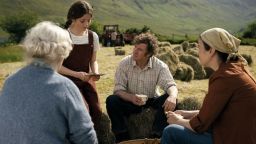 “The character of Joe is very much autobiographical,” Ward agrees, “but in the book,
there are only one or two passing mentions of what he does, and he’s like a copywriter
or something, that’s what he writes. But Pat thought it would be much more interesting
if he’s writing a novel, and it’s more in keeping with the theme of the film we were making.
“The character of Joe is very much autobiographical,” Ward agrees, “but in the book,
there are only one or two passing mentions of what he does, and he’s like a copywriter
or something, that’s what he writes. But Pat thought it would be much more interesting
if he’s writing a novel, and it’s more in keeping with the theme of the film we were making.
“I knew Pat’s documentary on McGahern and saw it years ago, but I didn’t rewatch it
or base my performance on him as a physical entity, it was more the mental approach —
 I think that was certainly a factor. At one point Pat was toying with the idea that
because Joe was an observer of everything, perhaps the entire movie has sprung from Joe’s
imagination. And there’s a truth in that somewhere, in that he is kind of writing about what he sees.”
I think that was certainly a factor. At one point Pat was toying with the idea that
because Joe was an observer of everything, perhaps the entire movie has sprung from Joe’s
imagination. And there’s a truth in that somewhere, in that he is kind of writing about what he sees.”
As it slowly unfolds, Rising Sun gives us tantalising
insights into a now largely vanished rural way of life. Lalor Roddy’s character
Patrick Ryan is a jobbing handyman who does not suffer fools lightly. When Joe goes
to visit him at Christmas, we see his spartan lodgings — a frosty cottage with no
central heating or plumbing, where he has lived alone for many years.
- Irish Independent
[Paul Whitington]
We again have the pleasure of opening our Short Films evening with the latest from G.Scott MacLeod in his History of Griffintown series.
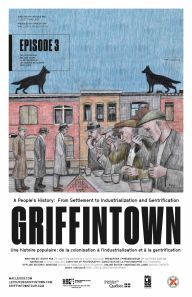 Griffintown Episode 3. The Depression and War Years 1929 -1945 (2025)
(Documentary, 21:24 mm:ss) Dir: G. Scott MacLeod
Griffintown Episode 3. The Depression and War Years 1929 -1945 (2025)
(Documentary, 21:24 mm:ss) Dir: G. Scott MacLeod
Griffintown transitions into the 20th century, starting with the socio-political changes in Griffintown
triggered by the Great Depression in 1929, and moving through key events later in the century.
 Mero (2024)
(Animation, 3:03 min) Dir: Jack Phelan
Mero (2024)
(Animation, 3:03 min) Dir: Jack Phelan
Mero makes her way into the city by train. It feels like this might be her first time out in some time.
She ducks into her favourite café where a mug of coffee and an encounter with a kindred spirit put her at ease.
Awards: Official Selection: Galway Film Fleadh
.jpg) An Chathair Mhór (Big City) (2024)
(Drama, 13:08 min) Dir: Cian O'Connor
An Chathair Mhór (Big City) (2024)
(Drama, 13:08 min) Dir: Cian O'Connor
An Irish film shot in America, An Chathair Mhór is New York's first Irish language film. It tells the story of a young man
who moves to New York from Ireland, and how he rekindles his relationship with the Irish language through a distant relative.
Awards: Official Selection: Galway Film Fleadh
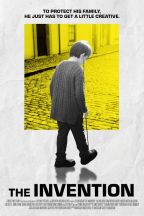 The Invention (2018)
(Comedy, 18:00 min) Dir: Leo McGuigan
The Invention (2018)
(Comedy, 18:00 min) Dir: Leo McGuigan
Frankie's father owes money to the wrong people. Frankie concocts a scheme to help him.
Awards: Best Short, Pasadena International Film Festival;
Audience Favourite, Capital Irish Film Festival;
Best International Short, Beveren Film Festival;
Best Director, Sydney Indie Film Festival
 Still Up There (2024)
Still Up There (2024)
(Animation, 4:46 min) Dir: Joe Loftus
A mortally wounded Astronaut awakens in the upper atmosphere after a catastrophic event.
He struggles to remember how he got there and latches himself on to the only familiar thing to him,
his own severed arm.
Awards: Best animation Ethereal Horror Fest Austin;
Best Short Belfast Film Festival
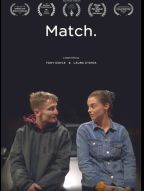 Match (2019)
(Drama, 12 min) Dir: Laura O'Shea and Tony Doyle
Match (2019)
(Drama, 12 min) Dir: Laura O'Shea and Tony Doyle
Two strangers 'match' online and meet for a casual ride - of a Monday, no less. What they both expected is quickly turned on its head
Awards: Winner of 'Best Irish Short' at Catalyst International Film Festival 2020
Winner of 'Audience Award' at the Richard Harris International Film Festival 2019
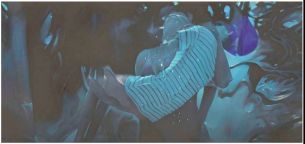 A Wind and the Shadow (2024)
A Wind and the Shadow (2024)
(Animation, 8:56 min) Dir: Kris Kelly
As the line between reality and memory blurs, a mother confronts her fears and uncertainty,
revealing a narrative of resilience and love. This journey leads to a profound moment
when her daughter bravely discusses her illness.
Awards: Irish Film and Television Awards Winner: Animated Short Film
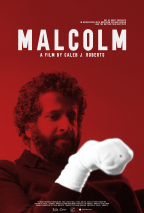 Malcolm (2023)
Malcolm (2023)
(Comedy, 11:00 min)
Dir: Caleb J. Roberts
In the aftermath of an emotionally abusive relationship, a man attends couples counselling with a
sock puppet likeness of his ex-boyfriend, Malcolm, with Tara-Lynne O'Neill
(Derry Girls) playing the therapist.
Awards: Official selection: Galway Film Fleadh,
BFI London Film Feastival, Belfast Film Festival, Bradford Queer Film Festival
 Dolorosa (2023)
Dolorosa (2023)
(Art film, 10:22 min) Dir: Emma Martin, Hugh O'Conor
Moving through a series of tableaux vivants, Dolorosa is a short film reflecting on humanity in all its glory,
innocence and desperation, power and vulnerability. Based around the Dvorák piece Stabat Mater
Awards: Official selection: Belfast Film Festival & Dublin International Film Festival
98 min - Dir: Joe Lawlor, Christine Molloy with Imogen Poots, Tom Vaughan-Lawlor, Lewis Brophy, Jack Meade, Patrick Martins, Dermot Crowley, Andrea Irvine, John Kavanagh
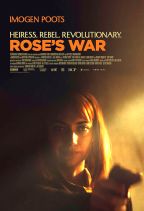 Wendy Ide of The Observer gave the film four out of five stars, calling it "a pleasingly taut heist movie"
and "a fascinating psychological study of fanaticism, with [Imogen] Poots's expressive performance
unpeeling the layers beneath [Rose] Dugdale's fervent belief in her cause. Kevin Maher of The Times
awarded the movie four stars out of five, praising the film as "an impressionistic and sometimes dreamlike
account of someone finding meaning in a hopeless world while remaining blind to its enormous human cost."
Wendy Ide of The Observer gave the film four out of five stars, calling it "a pleasingly taut heist movie"
and "a fascinating psychological study of fanaticism, with [Imogen] Poots's expressive performance
unpeeling the layers beneath [Rose] Dugdale's fervent belief in her cause. Kevin Maher of The Times
awarded the movie four stars out of five, praising the film as "an impressionistic and sometimes dreamlike
account of someone finding meaning in a hopeless world while remaining blind to its enormous human cost."
Wilson Chapman of IndieWire commended Imogen Poots's performance, writing that "Rose's War
ultimately hinges on Poots to do most of the heavy work, and the consistently great actor
is magnetic in the role, nervy and vulnerable but with a clear-eyed belief in her own convictions
that makes her pop off the screen. If the movie isn't ever quite able to inspire the same devotion
from the audience that Rose Dugdale has for her cause, watching a protagonist as compelling as her
still makes for a thrilling 90 minutes and change." Rodrigo Perez of The Playlist echoed these sentiments,
writing that "Poots is riveting as a revolutionary, and the drama knows how to pitch
the escalation of intensity, but Rose's War and its sense of guilt
and conscience is too obscure to affect the average viewer."
- Wikipedia
[Wendy Ide, Kevin Maher, Wilson Chapman, Rodrigo Perez]
"Joe Lawlor and Christine Molloy eschew the conventional biopic format to create a moody, fragmented
portrait of Rose Dugdale, an upper class woman from Devon who joined the IRA and led one of
the biggest art heists in history. "
Rose's War isn’t out to present the facts, but to ask:
why would an upper-class woman from Devon join the Irish republican cause? If it’s not national identity,
from what other soils can those seeds of radicalisation grow?"
- Sight & Sound
[Katie McCabe]
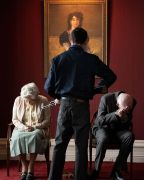 "Essentially, it’s a pleasingly taut heist movie – Dugdale masterminded an ambitious art raid
on a stately home, intending to barter the stolen paintings for the release of IRA prisoners.
But the picture also doubles as a fascinating psychological study of fanaticism, with Poots’s
expressive performance unpeeling the layers beneath Dugdale’s fervent belief in her cause."
- Observer (UK)
[Wendy Ide]
"Essentially, it’s a pleasingly taut heist movie – Dugdale masterminded an ambitious art raid
on a stately home, intending to barter the stolen paintings for the release of IRA prisoners.
But the picture also doubles as a fascinating psychological study of fanaticism, with Poots’s
expressive performance unpeeling the layers beneath Dugdale’s fervent belief in her cause."
- Observer (UK)
[Wendy Ide]
"Imogen Poots is excellent as Dugdale, seen almost throughout in searching closeup, wondering whether she has it in her to execute a possible witness in cold blood. Tom Vaughan-Lawlor, Lewis Brophy and Jack Meade are strong as her conspirators and Dermot Crowley is outstanding as Donal, a gentle innocent bystander with fading eyesight, reading To Kill a Mockingbird in braille in his cottage as he receives a disturbing visit from Dugdale. An entirely absorbing, coolly low-key movie." - The Guardian [Peter Bradshaw]
 Dugdale's memories in one scene gesture towards an explanation for her radicalization:
the sadness at being forced to hunt as a child (“Poor fox”); the humiliation of being asked
to curtsy for the Queen as a debutante. Such unease with her class eventually turned to disgust –
an inescapable feeling that ‘We are the baddies’. Watching news footage of Bloody Sunday –
the day in 1972 when 13 Derry civilians were slaughtered by British paratroopers –
is shown here as a crystallising moment for Dugdale, the point when righteous anger
turned to militant action.
Dugdale's memories in one scene gesture towards an explanation for her radicalization:
the sadness at being forced to hunt as a child (“Poor fox”); the humiliation of being asked
to curtsy for the Queen as a debutante. Such unease with her class eventually turned to disgust –
an inescapable feeling that ‘We are the baddies’. Watching news footage of Bloody Sunday –
the day in 1972 when 13 Derry civilians were slaughtered by British paratroopers –
is shown here as a crystallising moment for Dugdale, the point when righteous anger
turned to militant action.
That none of this fragmentation sidelines the heist shows the skill in Lawlor
and Molloy’s nimble storytelling. Dugdale is frequently shot from the perspective of a
terrified little boy who happens to be in the house, a device that amps up the tension
and muddies audience loyalties. Nerves are kept on edge by composer Stephen McKeon’s
urgent squall of snares and timpanis, but nothing feels rushed – time is taken to
sketch out Dugdale’s IRA comrades on the job: old hand dissident Dominic
(a sage, scene-stealing Tom Vaughan-Lawlor), and the rookie Martin (Lewis Brophy),
a loose cannon.
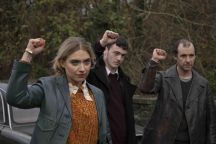 Every fumbling, violent action is handsomely shot. Filmed in Cinemascope,
Rose's War's look often has the feel of a triptych
painting (an image of the bloody, bound house-owner has a touch of Rubens). And the
camera is allowed to linger on the stolen artworks (in particular Vermeer’s Lady
Writing a Letter with her Maid, a slightly blunt vehicle for conversations about class divide)
before they’re bundled into a Triumph saloon.
Every fumbling, violent action is handsomely shot. Filmed in Cinemascope,
Rose's War's look often has the feel of a triptych
painting (an image of the bloody, bound house-owner has a touch of Rubens). And the
camera is allowed to linger on the stolen artworks (in particular Vermeer’s Lady
Writing a Letter with her Maid, a slightly blunt vehicle for conversations about class divide)
before they’re bundled into a Triumph saloon.
Much of the film plays out post-heist in the cottage in West Cork where they smoke,
strategise and stack priceless paintings on coffee tables. They talk of a safe house
in the nearby village of Baltimore – which gave the film its title when it was first released –
that we sense they will never reach. Dugdale (who we know by now is pregnant) wants to
prove herself to her comrades, but you also detect a sense of superiority in her eagerness
to educate them about the art they have just liberated.
While the latter's stories are as chilling and nauseating as it gets,
it's notable how few tears or raised voices there are. Instead, these women -
and it's mostly women we meet - tell their stories with clenched, clear voices,
still seething with rage but rehearsed down into ritual. The big emoting goes on
in composer Deirdre Gribbin's string-heavy score that's powerfully melancholy
but just astringent enough to keep things in check. Altogether, this is a nearly immaculate,
exemplary piece of documentary film-making.
- Sight & Sound
[Katie McCabe]
52m - Dir: Kathleen Harris
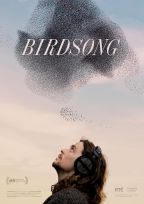 "I think it’s just such a beautiful thing to be able to step outside and listen to all of this natural sound;
it’s all around us; it’s free."
"I think it’s just such a beautiful thing to be able to step outside and listen to all of this natural sound;
it’s all around us; it’s free."
Ornithologist Seán Ronayne from Cobh, County Cork, is on a mission to record the sound of every bird species
in Ireland — nearly 200 birds. Often joined by his partner, Alba, he travels to some of the country’s most beautiful
and remote locations to capture its most elusive species and soundscapes: the busy seabird colony of Skellig Michael;
a native woodland free from road noise in the Burren; the corncrake stronghold of Tory Island; a solitary nest
in the Donegal uplands. Along the way, the film also turns its focus to Seán, whose hypersensitivity to sound
has proven both a struggle and a strength. At once inspiring and cautionary, Seán’s journey illustrates
the beauty and importance of sound and what listening can tell us about the state of our natural world.
Birdsong received Honorable Mention at the prestigious Jackson Wild Awards
which celebrate "excellence in storytelling that illuminates our connection to the natural world and collective
responsibility to the wild."
 "Recently I had the immense pleasure of watching Birdsong, a documentary film
directed by Kathleen Harris and produced by Ross Whitaker and Aideen O’Sullivan for True Films.
"Recently I had the immense pleasure of watching Birdsong, a documentary film
directed by Kathleen Harris and produced by Ross Whitaker and Aideen O’Sullivan for True Films.
This sensitive and beautifully made film follows Irish ornithologist and field recordist Seán Ronayne
during a project to sound-record all of the bird species in Ireland, both resident and migratory.
There is a lot more than that to absorb, though, which we’ll touch on here.
It’s likely impossible to not be moved from the opening scene, where the musical score,
cinematography, and artistic direction immediately establish a caring relationship between the birds
(portrayed with sound and image) and Seán Ronayne, who appears lit by golden sunlight. This care
easily transfers to the audience, or so I felt. The cinematography also offers us the gift of seeing
the birds in a way that feels intimate.
Seán visits a handful of significant places in Ireland, carrying recording gear and guiding
the audience through the project: he’s typically looking for a specific bird species that should be found
in those places. Or he may be listening to the whole rich soundscape, away from road and industrial
noise – something, he explains, that is unfortunately rare in Ireland."
read more
- at Earth.fm
[Melissa Pons]
 "There are about 200 species of bird that nest on the island of Ireland. These range from the regular visitors
to your garden like finches, to more elusive species like the white-tailed eagle. They make their home in just
about every location: cities, forests, or mountains. It is inarguable that no matter where in the country you live,
these animals will make an appearance in your daily routine, whether by sight or sound.
"There are about 200 species of bird that nest on the island of Ireland. These range from the regular visitors
to your garden like finches, to more elusive species like the white-tailed eagle. They make their home in just
about every location: cities, forests, or mountains. It is inarguable that no matter where in the country you live,
these animals will make an appearance in your daily routine, whether by sight or sound.
The presence of birds in our lives is just another thing that we take for granted. This is why,
back in January, the Irish public was captivated by the work and passion of Cork ornithologist, Seán Ronayne,
when he featured on The Tommy Tiernan Show to promote the film’s premiere at the Dublin International Film Festival.
Now, five months later, RTÉ has broadcast Birdsong for the nation;
a documentary a year in the making that follows Ronayne on his journey to record every bird species in Ireland.
Birdsong is more than a simple observation of nature. Through Ronayne,
the natural Irish landscape is framed to remind us how this incredible beauty is something vital to be protected.
Ronayne himself is open about his love for birds and this passion is the driving force of the film. His unabashed
focus is stutteringly human and the essence of what makes this film so alluring.
Ronayne travels across the country, from the Skelligs, to the Burren, and up to Donegal in his search
to observe individual species. The striking scenery is set against VO from Ronayne on location, as well as
his formal talks promoting his work. Whether speaking to children or adults, the audience is always captivated
by his incredible knowledge and database of sound. His website,
Irishwildlifesounds.com, is an extensive database that remains open for free for anyone. His openness,
in exploring both biodiversity and neurodiversity, provides quietly intimate insights into both Ronayne and his world.
Watching Ronayne traverse Ireland, sometimes joined by his partner, Alba, is a wonderfully enlightening
experience. His ability to recognise every bird call is so fascinating that it almost makes you wish
you could go for a walk through the woods with him, just to see it in action. Birdsong
is a beautifully authentic piece and shows Ireland at its very best, in all its natural glory."
- filmireland.net
[Adelaide Thermes Kane]
 Birdsong is a wonderful documentary which dare I say is too short at 50 minutes.
It’s a beautiful ode to human determination, breathtaking scenery including capturing a moment of murmuration
and a stark reminder of what we might lose, if birdsong is lost.
Birdsong is a wonderful documentary which dare I say is too short at 50 minutes.
It’s a beautiful ode to human determination, breathtaking scenery including capturing a moment of murmuration
and a stark reminder of what we might lose, if birdsong is lost.
Birdsong follows one man’s quest, Sean Ronayne, to record the bird song
of 200 species of birds in Ireland. 63% of these birds are at risk of extinction and when we meet Sean he’s
recorded 151 individual bird songs. It’s beautifully shot and a compelling portrait of human determination
to capture nature’s call before it becomes extinct.
I’d never given much thought of birdsong. During the pandemic I noticed there was birdsong but that was that.
In this documentary, Sean gives a wonderful interpretation of what their song represents – the fact that the birds
are giving thanks in the morning to say they survived the night and the predators. It’s quite remarkable
how many birds he can identify, as well as demonstrating the intelligence of birds; we hear a jay barking at a dog.
His deep obsession is marked by an Asperger’s diagnosis. However, rather than dwell on this,
Kathleen Harris, the film maker chooses to focus on the positive aspect of what this condition results in;
obsession to record something for the good of everyone. Without his singular obsession,
we wouldn’t have the recording of all these birds.
The film follows his quest to quite remote, never before seen parts of Ireland as Sean records the bird song,
such as Tory Island. After watching this documentary you will never listen to bird song in quite the same way again.
Sound is something we take for granted but Birdsong will make you stop
and think about the importance of nature and birds.
- from Liquid Marmalade
1h 45m - Dir and writers: Rich Peppiatt, and Móglaí Bap, Mo Chara, DJ Próvai; Distributed by: Curzon Film with: Móglaí Bap, Mo Chara, DJ Próvai, Josie Walker, Fionnuala Flaherty, Jessica Reynolds, Adam Best, Simone Kirby, Michael Fassbender
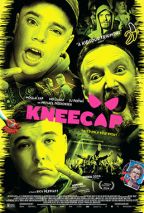 "In Kneecap, an audacious and kinetic movie that bangs,
Michael Fassbender’s character, Arlo, says to his young son, 'Every word of Irish spoken
is a bullet for Irish freedom'.
"In Kneecap, an audacious and kinetic movie that bangs,
Michael Fassbender’s character, Arlo, says to his young son, 'Every word of Irish spoken
is a bullet for Irish freedom'.
It’s an avowedly political line of dialogue in a movie that has a strong perspective,
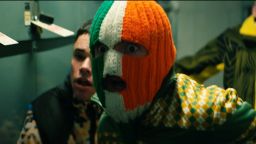 which is partly why Kneecap is such an intoxicating movie.
It crackles with energy, attitude and youth, and takes you along for a riotous and persuasive ride.
which is partly why Kneecap is such an intoxicating movie.
It crackles with energy, attitude and youth, and takes you along for a riotous and persuasive ride.
By the end of the film, you’ll probably want to trade in your wardrobe for some green threads."
- The Nightly (AU)
[Wenlei Ma]
"It’s hard to imagine Gerry Adams and Michael Fassbender starring in the same movie but that’s the power of the Kneecap story." - Film Ireland Magazine [Carmen Bryce]
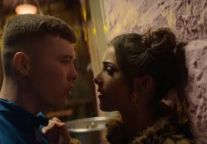 "When fate brings a Belfast teacher into the orbit of self-confessed "lowlife scum"
Naoise and Liam Óg, the needle drops on a hip-hop act like no other. Rapping
in their native Irish language, they soon lead a movement to save their mother tongue."
"When fate brings a Belfast teacher into the orbit of self-confessed "lowlife scum"
Naoise and Liam Óg, the needle drops on a hip-hop act like no other. Rapping
in their native Irish language, they soon lead a movement to save their mother tongue."
Rapping in their native Irish language, KNEECAP fast
 become the unlikely figureheads of a Civil Rights movement to save their mother tongue.
But the trio must first overcome police, paramilitaries and politicians trying to silence
their defiant sound -- whilst their anarchic approach to life often makes them their
own worst enemies. In this fiercely original sex, drugs and hip-hop biopic
KNEECAP play themselves, laying down a global
rallying cry for the defense of native cultures.
become the unlikely figureheads of a Civil Rights movement to save their mother tongue.
But the trio must first overcome police, paramilitaries and politicians trying to silence
their defiant sound -- whilst their anarchic approach to life often makes them their
own worst enemies. In this fiercely original sex, drugs and hip-hop biopic
KNEECAP play themselves, laying down a global
rallying cry for the defense of native cultures.








 17 minutes - 2024 - drama
17 minutes - 2024 - drama click here!
click here!